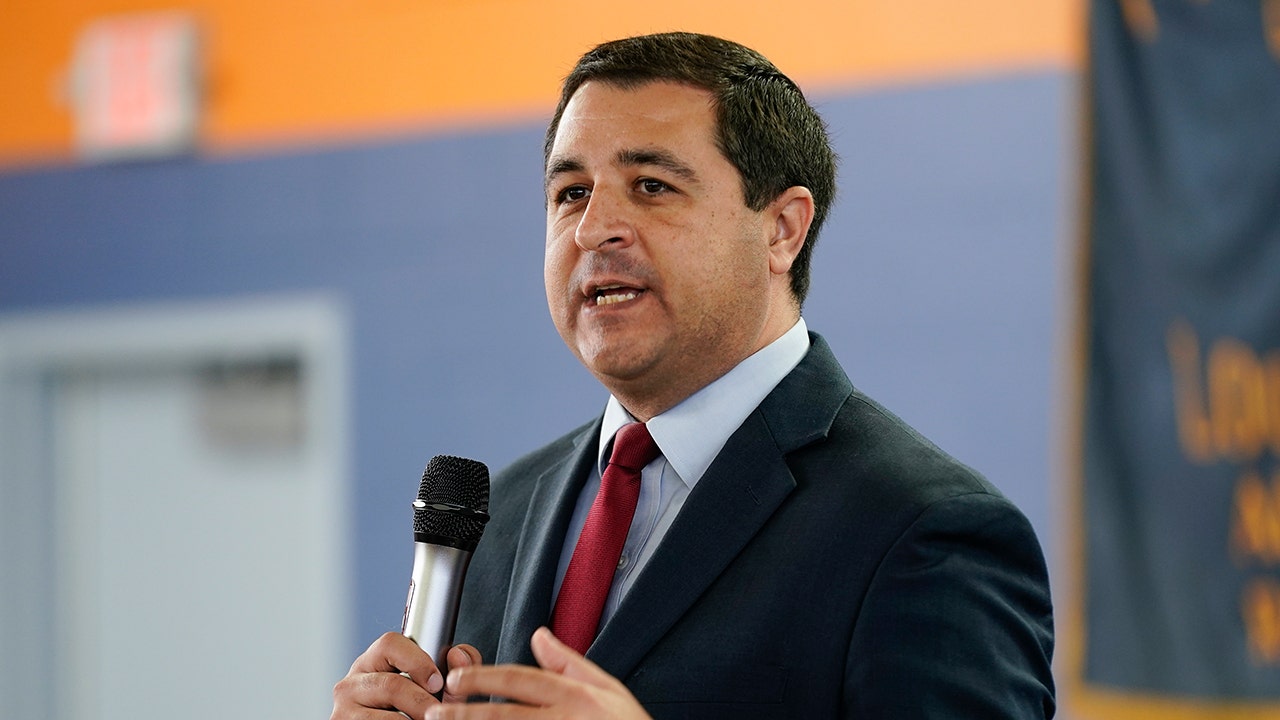Organizers in several Super Tuesday states are calling on voters to oppose President Biden at the ballot box over his stance on the war in Israel and Gaza, building on momentum that began last month in Michigan.
More than 101,000 Michiganders voted “uncommitted” in the state’s Democratic primary, after a group of young Arab Americans started a campaign encouraging voters to protest Mr. Biden’s alliance with Israel — earning two delegates to the Democratic National Convention.
Inspired by the campaign, pro-Palestinian groups around the country started similar efforts to push the president to call for a permanent cease-fire.
In Colorado, a group of Palestinian activists scrambled to create a social media campaign for the state’s “noncommitted delegate” option while Michigan returns were still coming in last week. In Minnesota, organizers knocked on doors and held get-out-the-vote events to promote the “uncommitted” category, with outreach to Muslim Somali Americans and young voters. And in Massachusetts, thousands of protesters at a rally in Cambridge chanted “no preference,” the similar designated protest option.
The campaigns have been fragmented, organized with far less time and resources than Michigan’s operation. Many were planned in a matter of days, well after early voting had already begun, and several organizers declined to articulate specific benchmarks for what would constitute success on Tuesday night beyond the goal of seeing Mr. Biden move his position. (Organizers in Minnesota said they were aiming for 5,000 “Uncommitted” votes, a low target that was about double what the category received in the 2020 Democratic primary.)
The other states also lack Michigan’s position in the broader backlash to Mr. Biden’s policy: The state has a sizable Arab American population, for whom the issue has been particularly painful, and ahead of the vote, prominent Democrats in the state warned about the potential for political peril. The “uncommitted” effort drew the backing of Representative Rashida Tlaib, a member of the group of liberals in the House known as the squad.
Mr. Biden is expected to win all of the primary contests where activists have begun “uncommitted” efforts, which include Colorado, Massachusetts and Minnesota, states he won in 2020, and North Carolina, a battleground state that Mr. Biden narrowly lost to former President Donald J. Trump. But the prospect of a close election in November means that any slip in support could hurt his re-election prospects.
“What we are up against in November is a really dangerous candidate in Donald Trump, who will do immense harm to our communities, and is a real existential threat to our democracy — that is real and we see that,” said Elianne Farhat, one of the organizers with Uncommitted Minnesota. “But right now, we’re focusing on sending a message to President Biden, who is in control right now.”
The Biden administration has, in recent weeks, grown more forceful in urging Israel and Hamas, which attacked Israel on Oct. 7, to come to an agreement for a pause in fighting, and for more aid to come into Gaza.
The United States on Saturday airdropped 38,000 meals into the region, which is facing a humanitarian crisis. On Sunday, Vice President Kamala Harris called for an “immediate cease-fire, for at least the next six weeks.” And on Monday, Mr. Biden wrote on X that he would “not let up pushing for a deal that secures the release of the remaining hostages held by Hamas, brings an immediate cease-fire to Gaza for at least six weeks, and allows for a surge of aid to the entire Gaza Strip.”
“The president hears the voters participating in the uncommitted campaigns,” said Lauren Hitt, a spokeswoman for the Biden campaign. “He shares their goal for an end to the violence and a just, lasting peace — and he’s working tirelessly to that end.”
But organizers opposing Mr. Biden said in interviews those moves weren’t enough. Several credited the Michigan campaign for recent policy shifts and said they hoped to further push the administration’s position.
“We know how much anger there is out there, and we’ve known that for months, but it was inspiring to everyone to see it translated into effective political results,” said Cole Harrison, the executive director of Massachusetts Peace Action, an antiwar group. “We want to show that the anger isn’t just confined to Michigan.”
Some of Mr. Biden’s allies worry that continued efforts to oppose the president will weaken him in the general election against Mr. Trump. “Elections have a certain amount of momentum,” said Keith Ellison, Minnesota’s Democratic attorney general, who voted for Mr. Biden.
Mr. Ellison, who was the first Muslim elected to Congress in 2006, said “there needs to be a cease-fire now.” But he argued that Mr. Trump posed a threat to American democracy and needed to be opposed at all costs — something that Mr. Biden’s opponents say it is up to the Democratic Party to resolve.
“If Joe Biden thinks that just giving people crumbs, as he has in the past, is going to work for him, he’s in for a very rude awakening,” said Abdullah Elagha, an organizer with the Colorado Palestine Coalition, which said it made about 30,000 calls.
Outreach was cobbled together in a short period by groups already organizing pro-Palestinian protests — in Massachusetts and Colorado, organizers used already planned rallies over the weekend to promote the protest votes. Uncommitted Minnesota said it spent about $20,000 on the campaign since beginning last Monday. Most outreach in other states has been virtual: Mr. Harrison said that the Massachusetts operation, which started Saturday, raised about $4,000 on Sunday to power their text outreach.
The efforts have not received significant endorsements in many of these states. In Minnesota, Representative Ilhan Omar, another member of the squad, has accused the Biden administration of “greenlighting the massacre of Palestinians” but did not call on Democrats to vote uncommitted. (Ms. Omar’s office declined an interview request.)
The Super Tuesday efforts are also being promoted by the national Abandon Biden campaign, a group that started in December made up of voters and organizers who have pledged not to vote for Mr. Biden in November, regardless of whether he shifts his stance.
“What is a sham is for the Democratic Party to think that they can bully us with the Republican Party,” said Rania Masri, an activist supporting that campaign in North Carolina. “We are not only going after the president — we are going after every congressional official that supports this genocide, and we are promising not to vote for any of them.”
The issue may plague Mr. Biden’s campaign past Tuesday. In Georgia, organizers are encouraging voters to leave the presidential option blank ahead of its primary on March 12. In Washington, organizers are pushing similar efforts to vote “uncommitted” in the state’s primary next week.
“Listen to Michigan was an inspiration to a lot of movements across the country,” said Rami Al-Kabra, a city councilman in Bothell, Wash. “This is an antiwar effort. It was not our first choice, but we have to let President Biden know that our votes are not to be taken for granted.”
Nicholas Nehamas contributed reporting from Minneapolis.






